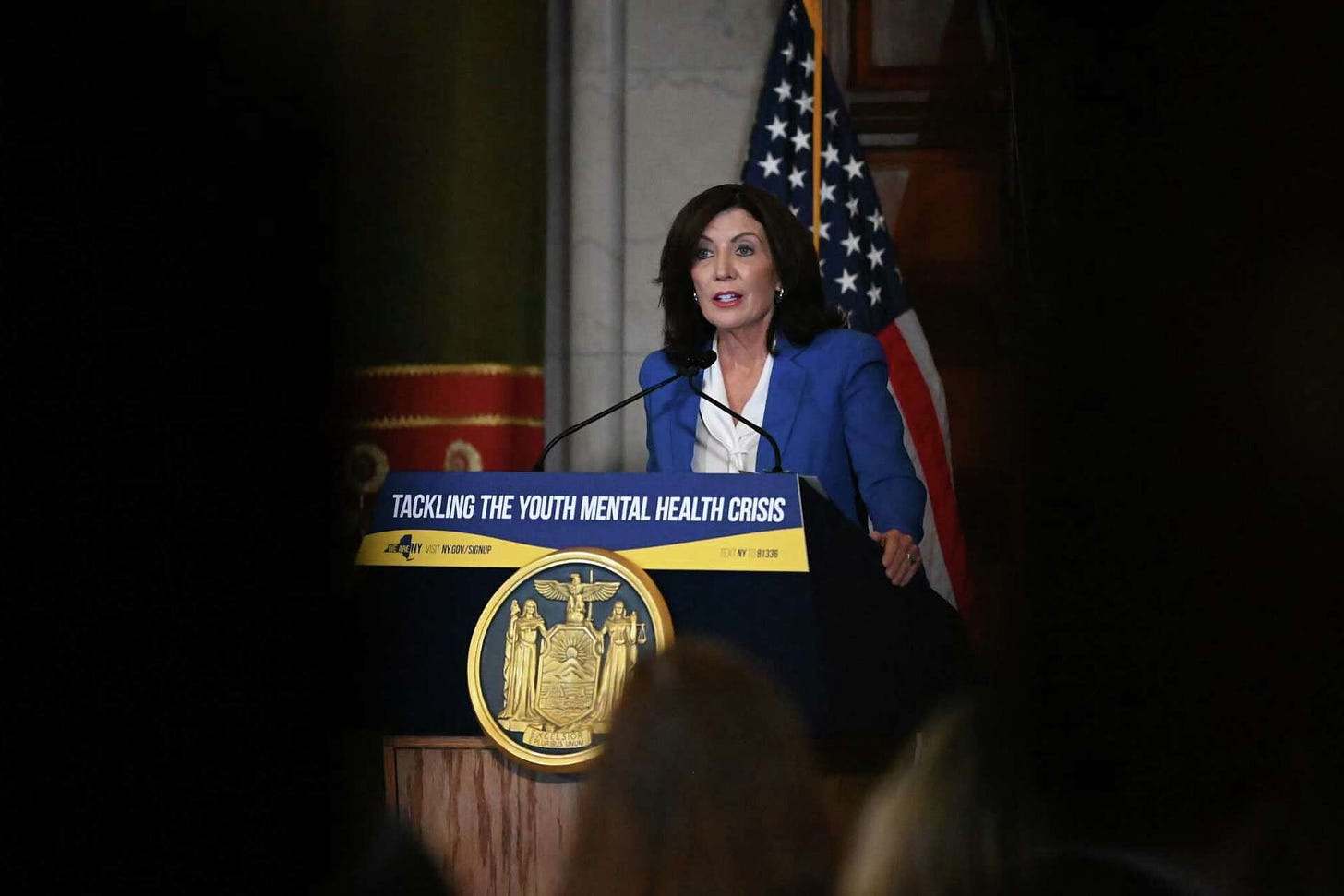Social media deal reached, temporary disability benefit expected to rise
Plus: Former DEC Commissioner Basil Seggos is this week's CapCon Q&A.
Good afternoon — it’s Tuesday, and National Cheese Day.
TUESDAY, JUNE 4, 2024
TODAY’S CAPCON:
Hochul and lawmakers have reached a deal on social media regulation bills.
Scoop: The temporary disability benefit is poised to rise for the first time since 1989.
Updates on the even-year elections amendment, packaging reduction, and more.
CapCon Q&A with former DEC Commissioner Basil SEGGOS.
Republicans want the state parole board to block parole for two men.
🔨 Is Tomorrow a Session Day? Yes.
🌞 Tonight’s Weather: Albany: Mostly cloudy, low 60s. New York City: Clouds and fog, low 60s. (National Weather Service)
📱 Hochul, lawmakers reach deal on social media regulation bills, Gounardes says
💻 After the two measures didn’t make it into this year’s state budget, Hochul put them at the top of her priority list for the rest of session.
Amended versions of a pair of bills intended to regulate how social media platforms interact with children were introduced Monday night by their sponsors.
Those bills are the results of a three-way agreement between Gov. Kathy HOCHUL and the Legislature, said Sen. Andrew GOUNARDES, a Democrat who sponsors the bills.
Gounardes told reporters Tuesday morning that negotiators have spent the past few weeks fine-tuning the bills to make them as airtight as possible against an expected legal challenge from the tech industry.
“We think we’ve avoided all those issues and all those concerns,” Gounardes said. “It behooves us if we want to pass this — and make it stick and hopefully become a model for the nation — that we get it right.”
Gounardes said he doesn’t know what the vote tally will be. Republicans have expressed interest in social media regulation as well.
Hochul hasn’t independently announced the agreement yet. She was busy Tuesday flying to Washington, D.C., to attend President Joseph Biden’s immigration announcement at the White House.
Chamber of Progress, which represents a number of tech companies, said they’re still opposed to the bill and predicted it wouldn’t pass constitutional muster.
“Algorithms actually make online platforms better for teens, by boosting healthy content over hate, harm and misinformation. Those kinds of unconstitutional limits are going to have a hard time surviving a court challenge,” said Adam Kovacevich, the group’s CEO.
🖋️ The amended versions of the bills have significant changes but keep the intent of the legislation intact.
The Stop Addictive Feeds Exploitation for Kids Act has gotten more attention out of the two. Let’s start there:
1. The SAFE For Kids Act: S7694A
The SAFE for Kids Act would define what’s considered an “addictive feed” on an “addictive social media platform” and place limitations on how they interact with children.
“Addictive feeds” would be banned for children unless the social media company receives consent from a parent.
It would also be illegal for those companies to send children push notifications related to an “addictive feed” from midnight to 6 a.m. without parental consent.
The definition of an “addictive feed” can be found in the bill text, but it’s essentially characterized as a digital service that serves a user content based on information associated with their account or device.
A major difference in the new version of the bill is the responsibility of the state Attorney General’s Office.
The original version of the bill would have allowed parents to sue social media companies for violating the bill’s elements.
The new version removed that option but kept the ability of the Attorney General’s Office to sue social media companies for damages over violations.
The same office would also be responsible for promulgating regulations that would be used to identify how social media companies could feasibly determine if a user is a minor.
Those regulations would also take into consideration the size of some social media companies in relation to how they could reasonably afford to implement that technology.
Gounardes said conversations with the Attorney General’s Office have already included work on areas of age verification that could pay off.
“We don’t expect there to be that much of an overturning of the apple cart in terms of how we’re going to use age verification technologies,” Gounardes said.
Important: The bill has a severability clause, which means if part of the law is struck down in court the rest of it could be allowed to stand. But that’s up to the judge.
2. New York Child Data Protection Act: S7695B
The Child Data Protection Act is intended to prevent websites and digital services from using data collected from minors to serve them targeted content.
If a minor user clicks on photos of Taylor Swift, Gounardes said, this bill would prevent them from being bombarded with content about the artist.
“You can still collect data that is necessary for the functioning of a website,” Gounardes said. “But you cannot collect more data than necessary for a commercial purpose.”
The new version of the bill prevents websites and other services from using the data collected on a minor user for any purpose.
There are exceptions, such as if that data is required to maintain “a specific product or service requested” by a minor user.
Important: This bill also has a severability clause.
A vote hasn’t been scheduled on the bills, but they’re expected to move before lawmakers leave Albany for the year this week.
🤒 Temporary Disability Benefit poised to rise through after-budget deal
💵 The current benefit for people out of work on temporary disability leave is $170 per week. Lawmakers and Hochul are expected to raise that.
An agreement between the Senate, Assembly and Hochul’s office is poised to raise the temporary disability benefit in New York for the first time since 1989.
Keep reading with a 7-day free trial
Subscribe to Capitol Confidential with Dan Clark to keep reading this post and get 7 days of free access to the full post archives.






